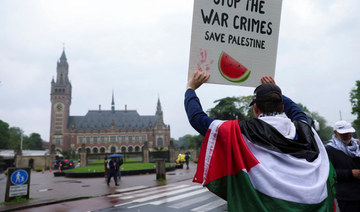Peshawar, Pakistan: Multiple blasts and a gun attack killed more than 50 people and wounded at least 170 in three Pakistani cities on the last Friday of Ramadan, Islam’s holiest month, as officials warned the toll could rise.
Authorities said 37 people were killed and more than 150 wounded when twin blasts tore through a market in Parachinar, capital of Kurram district, a mainly Shiite area of Pakistan’s tribal belt.
Local official Nasrullah Khan told AFP that the first blast detonated as the market was crowded with shoppers preparing for the Eid ul-Fitr festival marking the end of Ramadan.
“When people rushed to the site... to rescue the wounded, a second blast took place,” he said.
Basir Khan Wazir, the top government official in Parachinar later told AFP that apparently both the blasts were carried out by two suicide bombers.
“We have transported 15 injured to Peshawar but condition of 15 to 20 injured people were critical,” Wazir said and warned that the death toll could rise.
Prime Minister Nawaz Sharif called for security to be beefed up across the country as he condemned the attack, saying that no Muslim could ever imagine committing such a “horrific” act.
Pakistan has seen a dramatic improvement in security in the last two years, but groups such as the umbrella Pakistani Taliban and other extremist outfits still retain the ability to carry out attacks.
Local lawmaker Sajid Hussain Turi, the owner of the market, said bazaars in Parachinar had been barricaded off and vehicles banned from the area after multiple attacks have hit the city this year.
Parachinar was the location of the first major militant attack in Pakistan in 2017, a bomb in a market which killed 24 people in January and was claimed by the Pakistani Taliban. In March a second Taliban attack killed a further 22 people.
There was no immediate claim of responsibility for Friday’s attack.
Kurram, one of Pakistan’s seven semi-autonomous tribal districts, is known for sectarian clashes between Sunnis and Shiites, who make up roughly 20 percent of Pakistan’s population of 200 million.
The twin blasts in Parachinar followed a bombing earlier in the day in southwestern Quetta, capital of insurgency-wracked Balochistan province, that killed at least 13 people.
Investigators said the attack targeted police. It was claimed by both the local affiliate of the Daesh group and by Jamaat-ul-Ahrar (JuA), an offshoot of the Pakistani Taliban, according to the SITE monitoring group.
There was no immediate explanation for the dual claims. Islamic State Khorasan Province, the Middle Eastern group’s affiliate in Afghanistan and Pakistan, has been known to work with the myriad of Pakistani militant groups in previous attacks, including with JuA.
Officials at the city’s Civil Hospital said at least 13 people were killed and around 20 injured, mostly by shrapnel. Police officials said nine policemen were among the dead.
At the hospital in Quetta, worried children stood by the bloodstained cots of wounded relatives, and Pakistani soldiers visited injured colleagues.
Stunned survivors could give few details about the attack. “I was sitting on a chair. There was an explosion. I got injured and fell down,” said one victim, Gulzar Ahmad.
Separately, gunmen on motorcycles Friday shot dead four policemen sitting at a roadside restaurant at SITE area in southern port-city Karachi.
Asif Bughio, a senior police official, told AFP that four attackers wearing helmets fled the scene.
Pakistan has waged a long war with militancy, but security has markedly improved in the country since its deadliest-ever terror attack, an assault on a school in northwestern Peshawar in which Taliban gunmen left more than 150 people dead, most of them children.
That attack shocked a country already grimly accustomed to atrocities, and prompted the military to intensify an operation in the tribal areas targeting militants.
The army has also been fighting in mineral-rich Balochistan, the country’s most restive province, since 2004, with hundreds of soldiers and militants killed.
Its roughly seven million inhabitants have long complained they do not receive a fair share of its gas and mineral wealth, but a greater push by Pakistani authorities has reduced the violence considerably in recent years.
More than 50 people killed in multiple Pakistan attacks
More than 50 people killed in multiple Pakistan attacks
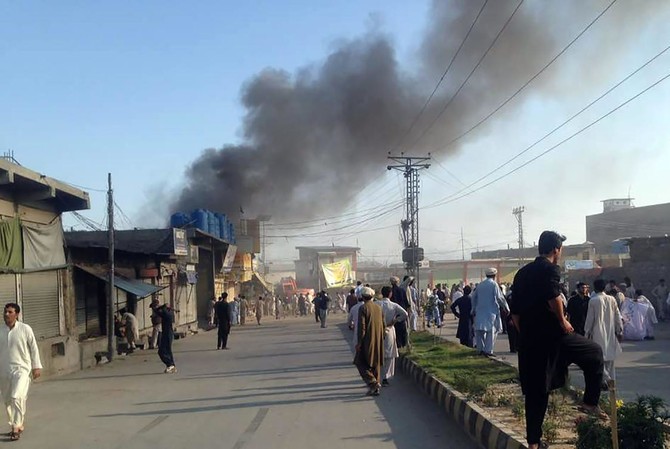
As Pakistan’s Jacobabad sizzles at 49°C, residents brace for ‘unbearable’ heat in coming months
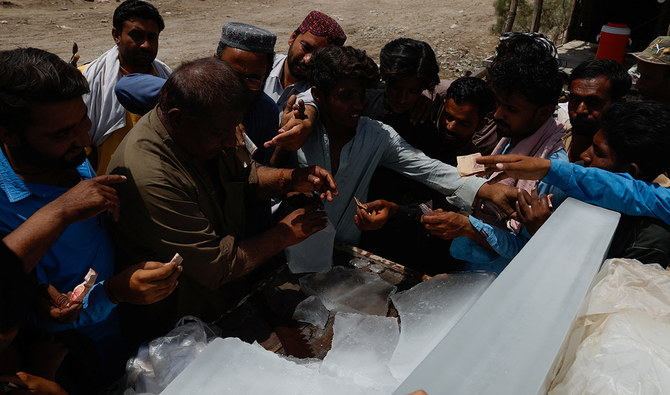
- Jacobabad in Pakistan’s southern Sindh province is counted among world’s hottest cities
- Residents say prolonged power crisis makes heat unbearable during summer months
ISLAMABAD: The temperature in southern Pakistan’s Jacobabad city skyrocketed to 49° C on Sunday but residents said they feared the coming months would cause “unbearable heat” in the city, as many parts of the country remain in the grip of a heat wave.
Jacobabad in Pakistan’s southern Sindh province is considered one of the hottest places on earth, where temperatures during the summer frequently cross 50° C. Prolonged power outages and water crisis mean the summer months are particularly harsh for the city’s roughly 300,000 residents.
Pakistan’s disaster management authority warned earlier this month temperatures in certain areas of Pakistan’s Sindh and eastern Punjab provinces could surge to 40 degrees Celsius between May 15-30.
But residents, however, are more concerned with what the coming months of June, July and August would bring. Zulfiqar Ali, the owner of a herbal medical shop in the city, said the breeze makes the current heat wave bearable.
“The actual heat starts in June, July and August,” Ali told Reuters. “The winds stop totally at that time, so it becomes very humid. That heat is unbearable. We sweat so much that we cannot even work.”
Sharjil Ahmed, a school teacher, said residents consume cold drinks to beat the heat when the temperature crosses 50° C. However, power breakdowns make life difficult for the city’s residents.
“Because of power load shedding, there is a shortage of ice most of the time,” Ahmed said. “We try to stay in the shade, under trees.”
Increased exposure to heat, and more heat waves, have been identified as one of the key impacts of climate change in Pakistan, with people experiencing extreme heat and seeing some of the highest temperatures in the world in recent years. The South Asian country of more than 241 million, one of the ten most vulnerable nations to climate change impacts, has also recently witnessed untimely downpours, flash floods and droughts.
Climate change-induced extreme heat can cause illnesses such as heat cramps, heat exhaustion, heatstroke, and hyperthermia. It can make certain chronic conditions worse, including cardiovascular, respiratory, and cerebrovascular disease and diabetes-related conditions, and can also result in acute incidents, such as hospitalizations due to strokes or renal disease.
According to the Global Climate Risk Index, nearly 10,000 Pakistanis have died while the country has suffered economic losses worth $3.8 billion due to climate change impacts between 1999 and 2018. A deadly heat wave that hit Pakistan’s largest city of Karachi, the capital of Sindh, claimed 120 lives in 2015.
Israel orders Spain to stop consular services for Palestinians from June 1

- Israel statement: Spain’s consulate in Jerusalem is ‘authorized to provide consular services to residents of the consular district of Jerusalem only’
JERUSALEM: Israel’s foreign ministry said Monday it had told the Spanish consulate in Jerusalem to stop offering consular services to Palestinians from June 1 over Madrid’s recognition of a Palestinian state.
The ministry said in a statement that Spain’s consulate in Jerusalem is “authorized to provide consular services to residents of the consular district of Jerusalem only, and is not authorized to provide services or perform consular activity vis-a-vis residents of the Palestinian Authority.”
Amid heat wave spell, authorities say mercury to rise further in southern Punjab from today
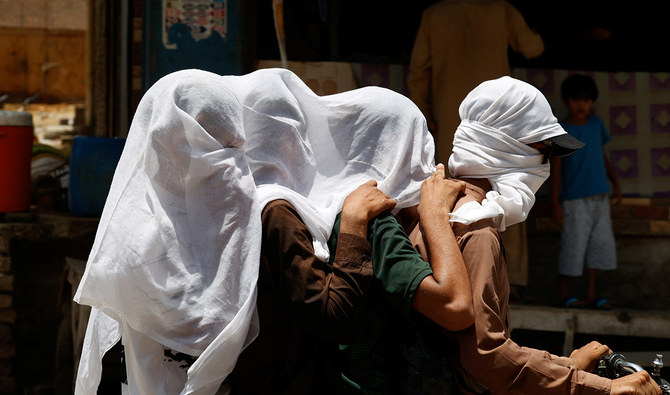
- Temperatures to rise in Bahawalpur, Rahim Yar Khan, Bahawalnagar, Dera Ghazi Khan, Multan districts from Monday
- Heat wave first spell to last till May 30, second to begin from June 7-8 followed by third one in last week of June
ISLAMABAD: A spokesman for the Punjab Disaster Management Authority has said temperatures will continue to rise in southern parts of the Punjab province from today, Monday, amid an ongoing heat wave that is expected to carry on until next month.
Pakistan’s disaster management authority warned earlier this month temperatures in certain areas of Pakistan’s southern Sindh and eastern Punjab provinces could surge to 40 degrees Celsius between May 15-30. The Provincial Disaster Management Authority (PDMA) warned of an “intense” heat wave in the southern districts of Punjab, with severe risk identified in Bahawalpur, Rahim Yar Khan, Dera Ghazi Khan and Multan districts from May 21 to May 27.
An estimated 18 million students are also unable to attend classes because Punjab, Pakistan’s populous province Punjab, has ordered shutting down schools this month due to rising temperatures.
“Mercury will rise further in Bahawalpur, Rahim Yar Khan, Bahawalnagar, Dera Ghazi Khan and Multan districts from today, Monday,” a Punjab official was quoted as saying by state broadcaster Radio Pakistan on Monday.
“The National Institute of Health has advised people to avoid unnecessary outings and drink more water to prevent themselves from the effects of heatwave.”
Addressing a press conference last week, the Prime Minister’s Coordinator on Climate Change Romina Khurshid Alam said 26 districts of the country were in the grips of a heat wave since May 21.
Alam said the first wave would last till May 30, the second would begin from June 7-8 and the third one in the last week of June. May and June were recorded as the “hottest and driest” with higher monthly average temperatures, she added, appealing to the masses, especially children and elderly, to adopt preventive measures.
She noted that the severity of heat waves had increased rapidly during the past few months with 13 districts of Sindh, nine of Punjab and four districts of Balochistan experiencing “severe heat.”
“Harsh weather is likely to persist at least till June 3. There is no possibility for respite, at least for Sindh. The heat spell may break in parts of Punjab but that, too, after June 4,” the chief meteorologist said last week.
Increased exposure to heat, and more heat waves, have been identified as one of the key impacts of climate change in Pakistan, with people experiencing extreme heat and seeing some of the highest temperatures in the world in recent years. The South Asian country of more than 241 million, one of the ten most vulnerable nations to climate change impacts, has also recently witnessed untimely downpours, flash floods and droughts.
Climate change-induced extreme heat can cause illnesses such as heat cramps, heat exhaustion, heatstroke, and hyperthermia. It can make certain chronic conditions worse, including cardiovascular, respiratory, and cerebrovascular disease and diabetes-related conditions, and can also result in acute incidents, such as hospitalizations due to strokes or renal disease.
According to the Global Climate Risk Index, nearly 10,000 Pakistanis have died while the country has suffered economic losses worth $3.8 billion due to climate change impacts between 1999 and 2018. A deadly heat wave that hit Pakistan’s largest city of Karachi, the capital of Sindh, claimed 120 lives in 2015.
In 2022, torrential monsoon rains triggered the most devastating floods in Pakistan’s history, killing around 1,700 people and affecting over 33 million, a staggering number close to the population of Canada. Millions of homes, tens of thousands of schools and thousands of kilometers of roads and railways are yet to be rebuilt.
Pakistan PM praises European countries for recognizing Palestinian state, hopes for same attention for Kashmir
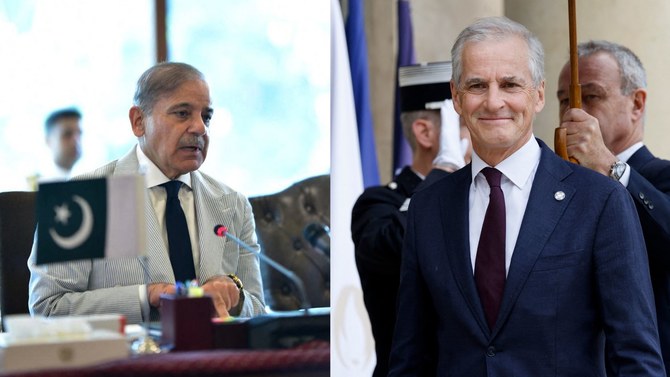
- Prime ministers of Ireland, Spain and Norway have said they will formally recognize Palestine as a state on May 28
- Himalayan region of Kashmir, administered in parts by India and Pakistan, has been a flashpoint between them since 1947
ISLAMABAD: Pakistan’s Prime Minister Shehbaz Sharif on Monday praised Spain, Norway and Ireland for their decision to recognize the state of Palestine, hoping that the international community will “pay the same amount of attention” to the plight of the people of Kashmir.
The prime ministers of Ireland, Spain and Norway announced on Wednesday they would formally recognize Palestine as a state on May 28, following recent recognitions by Barbados, Jamaica, Trinidad and Tobago and the Bahamas. The additions have brought the total number of countries recognizing the Palestinian state to nearly 150.
In a telephonic conversation with Norwegian PM Jonas Gahr Store on Sunday night, PM Sharif appreciated Norway’s “principled stance,” adding that it would send a message of hope and solidarity to the people of Kashmir suffering continuous bombardment at Israel’s hands.
“I expressed my hope that this bold, principled decision by Norway, Spain, and Ireland will encourage other countries to recognize the State of Palestine,” Sharif wrote on social media platform X from his official account that shares updates in Arabic.
“We hope the international community will pay the same amount of attention to the suffering and tragedy of Kashmiris who have been suffering from oppression and brutal occupation for 76 years.”
The Himalayan region of Kashmir has been a flashpoint between India and Pakistan since 1947 when the two countries gained independence from British colonial India. The nuclear-armed South Asian neighbors have fought two out of three wars over Kashmir.
Both countries claim the territory in full but administer parts of it. The western portion of the larger Kashmir region is administered by Pakistan as a nominally self-governing entity.
On Aug. 5 2019, Indian Prime Minister Narendra Modi withdrew Indian-administered Kashmir’s autonomy in a move that was seen by analysts as a strategy to tighten his grip over the territory. The decision provoked outrage in Pakistan and triggered the downgrading of diplomatic ties and suspension of bilateral trade between the two countries.
Israel’s war on Gaza has sparked international condemnation from rights activists and organizations and countries around the world. Israel’s constant bombardment has killed nearly 36,000 Palestinians, according to Gaza’s Health Ministry, which does not distinguish between civilians and fighters in its count.
Around 80 percent of Gaza’s 2.3 million people have fled their homes while severe hunger is widespread and UN officials say parts of the territory are experiencing famine.
Israel says Hamas triggered the war with its Oct. 7 attacks on Israel, in which Palestinian militants killed some 1,200 people and seized some 250 hostages. Hamas still holds some 100 hostages after many were released during a ceasefire last year.
ICC includes Pakistani legends Wasim, Waqar and Ramiz in World Cup commentary panel
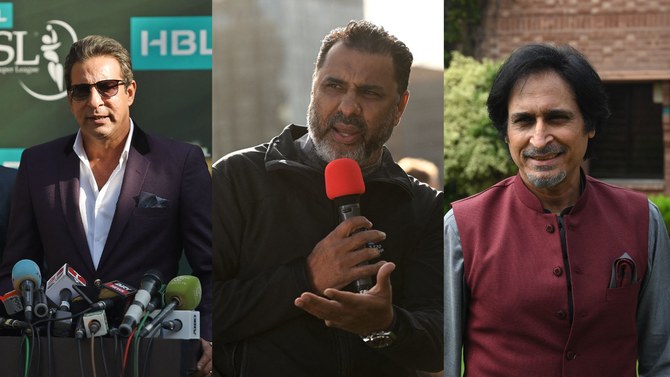
- Wasim Akram and Ramiz Raja are former World Cup winners who will share expert analysis during T20 World Cup 2024
- Veterans Ravi Shastri, Nasser Hussain, Ian Smith, Mel Jones, Harsha Bhogle and Ian Bishop to lead commentary team
ISLAMABAD: The International Cricket Council (ICC) recently announced it has roped in Pakistani cricket legends Wasim Akram, Waqar Younis and Ramiz Raja as members of a star-studded commentary panel for next month’s T20 World Cup to share their insights and expert analysis during matches.
The ICC Men’s T20 World Cup 2024, scheduled to kick off from June 1-29, will feature 20 teams across the world compete for the trophy. The tournament will be hosted for the first time partly in the United States while the West Indies will also host some matches of the tournament.
In a post on Sunday, the ICC said the commentary panel would be led by veterans such as Ravi Shastri, Nasser Hussain, Ian Smith, Mel Jones, Harsha Bhogle and Ian Bishop. Former men’s and women’s T20 World Cup champions Dinesh Karthik, Ebony Rainford-Brent, Samuel Badree, Carlos Brathwaite, Steve Smith, Aaron Finch and Lisa Sthalekar will also add insights to the game during the matches.
“Former 50-over World Cup winners Ricky Ponting, Sunil Gavaskar, Matthew Hayden, Ramiz Raja, Eoin Morgan, Tom Moody and Wasim Akram will also be lending their expert analysis to the upcoming tournament,” the ICC said.
The global cricket body said other big names part of the commentary team are Pakistan’s Younis, Dale Steyn, Graeme Smith, Michael Atherton, Simon Doull, Shaun Pollock and Katey Martin. Renowned names in broadcasting such as Mpumelelo Mbangwa, Natalie Germanos, Danny Morrison, Alison Mitchell, Alan Wilkins, Brian Murgatroyd, Mike Haysman, Ian Ward, Athar Ali Khan, Russel Arnold, Niall O’Brien, Kass Naidoo and former West Indies skipper Daren Ganga will also be part of the commentary team.
ICC will provide extensive coverage of the tournament across the 28 days of action with a pre-match show, an innings interval program and a post-match wrap-up.
The T20 World Cup is being seen by the ICC as a launch pad toward the sport’s return to the Olympics for Los Angeles 2028. The ninth edition of the tournament, in the fastest and most explosive form of the game, will be the biggest ever after the decision of the International Cricket Council (ICC) to expand the field from 16 nations to 20.
Nepal, Papua New Guinea and Oman are among nations relatively new to the big stage who will be looking to make their mark and grab attention with an upset win or two during the tournament.
Groups for T20 World Cup 2024
Group A: India, Pakistan, Ireland, Canada, United States
Group B: England, Australia, Namibia, Scotland, Oman
Group C: New Zealand, West Indies, Afghanistan, Uganda, Papua New Guinea
Group D: South Africa, Sri Lanka, Bangladesh, Netherlands, Nepal


